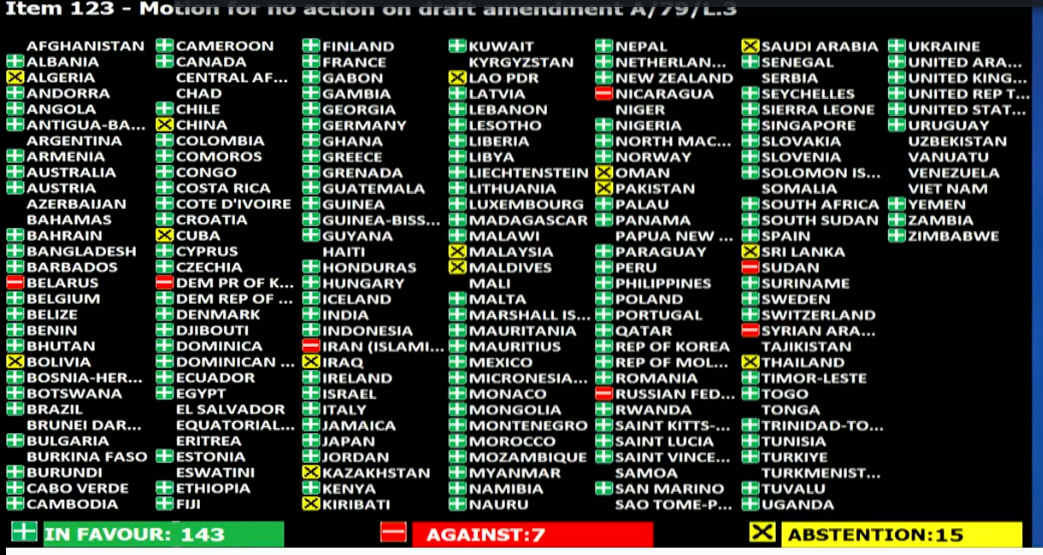
The Pact for the Future and the annexed Global Digital Compact and Declaration of Future Generations was adopted after a short round of statements, where Russia (backed by Iran, North Korea, Belarus, Syria, Venezuela, and Nicaragua) issued their discontent with the negotiation process and called for the inclusion of an amendment.
Russia’s key objection was that United Nations should not be allowed to “intervene in matters which are essentially within the domestic jurisdiction of any state”. Apart from that, they don’t want to give more power to the High Commissioner on Human Rights, they object to the speeding up of nuclear disarmament, and they don’t want to “equate non-governmental actors with states when making decisions on international technological agenda”.[1]
As a countermeasure, the Republic of the Congo (speaking on behalf of the African Union) proposed a motion that no action would be taken on the draft amendment, which was accepted by all but seven nations (and fifteen that abstained).
.
.
.

.
The General Assembly then adopted the Pact without a vote![2]
The fact that Russia is involved in a war against Ukraine, and that the supporting nations have autocratic rule, is not exactly beneficial to the genuine opposition to the Pact (for reasons of true democracy, national sovereignty and freedom of speech), as any critique of any kind risks being dismissed as part of Russian intelligence operation and/or supporting the views of totalitarian regimes.
It remains to be seen what happens with the Russian claim that they will distance themselves from the Pact, while the work on implementing it (with the stated goal to “safeguard future generations” and “turbocharge Agenda 2030” with the help of strategic foresight, anticipatory governance, and behavioural design) continues in global forums for cooperation like the G20 and BRICS—with Russian participation.
Despite their expressed dissatisfaction, Russia supports the UN’s central role in “coordinating the positions of member states and searching for collective responses to global challenges”. They did not block the adoption the Pact and will, without a doubt, implement the actions that they did not object to.
Russia especially welcomes The Declaration on Future Generations, the “bridging of the digital divide” for the SDGs, and a reform of the International Financial Architecture.
BRICS (with its ten member states) is chaired by Russia this year. Digitisation is high on the agenda with The Digital BRICS Forum held this week.
The fact is that the BRICS-members Brazil, Egypt, Ethiopia, India, South Africa, United Arab Emirates voted against Russia (and Iran), whereas China abstained.
The main concern of the BRICS countries is that Western Powers will be the main beneficiaries of the pact, not that the digital tools can be used for population control, online censorship, and for influencing our behaviour.
They want to be assured that they are included as equal partners in the emerging new world order with its digital world brain.
As a comment to my article The Media Silence Surrounding the UN Pact for the Future, the Swedish Government finally published a press release this Friday (September 20th, only two days before the Summit) about the delegation that would attend Summit of the Future, probably confident that no media attention would be given before the meeting.
The silence during the two years of negotiations is how “democracy” is defended from being “hijacked” by “backward thinking” and “anti-globalist” factions among the general public.
.

Screenshot from Sveriges Television’s news program Rapport about the adoption of the Pact for the Future, Sunday 22 september.
.
On the day of the adoption of the Pact, several newspapers, Swedish Radio and national television, woke up from their slumber and published the news about the Pact for the Future having been adopted.
I guess that our leaders now will inform us that “we” have agreed to the conditions spelled out in the Pact.
Have your government or media also finally informed you of the Pact? Please post links if you have any.
*
Click the share button below to email/forward this article to your friends and colleagues. Follow us on Instagram and Twitter and subscribe to our Telegram Channel. Feel free to repost and share widely Global Research articles.
Get Your Free Copy of “Towards a World War III Scenario: The Dangers of Nuclear War”!
Notes
[1] Statement from the Permanent Mission of the Russian Federation to the United Nations, estatements.unmeetings.org/estatements/10.0010/20240923090000000/qRMMeMjhrye_/PRAIRU_h_nyc_ru.pdf
[2] United Nations, World Leaders Pledge Bold Action to Protect Present, Future Generations amid Climate Crisis, Conflicts Gripping Globe, as General Assembly Adapts Pact for Future, press.un.org/en/2024/ga12627.doc.htm
All images in this article are from the author














